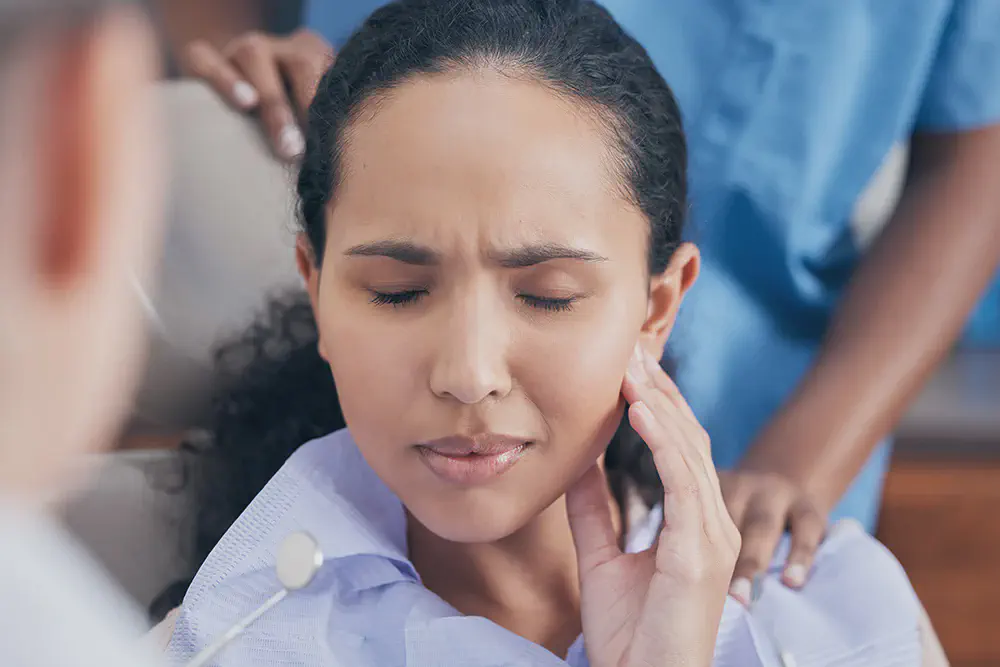A Gentle Recovery Starts Here
If you’ve just had a root canal, congratulations — you’ve taken the right step to save your natural tooth and protect your oral health. At Premier Dentistry in Gresham, OR, we understand that the idea of a root canal can feel intimidating, but the good news is that recovery is typically quick and comfortable when you follow the right root canal aftercare steps.
Whether you’re a patient from Gresham, Portland, Troutdale, or Fairview, this guide will walk you through everything you need to know about recovering from a root canal — including what to expect, how to manage any discomfort, and when to call your dentist.
Understanding Root Canal Recovery
A root canal treatment removes infection from the inside of your tooth and seals it to prevent further damage. While the procedure itself is pain-free, your tooth and surrounding tissue may feel a little tender for a few days afterward — similar to how a bruise feels after healing.
Every patient’s recovery is unique, but most people return to normal activities within 24–48 hours. Following your dentist’s instructions closely ensures faster healing and helps prevent complications.
Immediate Aftercare: The First 24 Hours
Here’s what you should do right after your appointment at Premier Dentistry:
- Let the Numbness Wear Off Before Eating
Your mouth may stay numb for a few hours. Avoid chewing until full sensation returns to prevent accidentally biting your cheek or tongue.
- Eat Soft Foods
Stick to gentle options such as yogurt, soup, mashed potatoes, smoothies, or scrambled eggs. Avoid crunchy or sticky foods until your tooth is fully restored with a crown.
- Avoid Hard Pressure on the Treated Tooth
If your root canal tooth doesn’t yet have its permanent crown, it’s slightly more fragile. Try to chew on the opposite side of your mouth until your restoration appointment.
- Manage Mild Discomfort
It’s normal to have slight soreness or sensitivity. Over-the-counter pain relievers like ibuprofen or acetaminophen usually help. If you were prescribed medication, take it as directed.
- Keep the Area Clean
Brush and floss carefully around the treated tooth, but don’t skip your routine — good hygiene prevents reinfection.
Day-to-Day Care: The First Week
Once the numbness fades, follow these best practices to promote smooth healing:
Maintain Gentle Oral Hygiene
Continue brushing twice daily with a soft-bristled toothbrush and non-abrasive toothpaste. Floss gently around the area to remove debris and bacteria.
Choose Soothing Foods
During your recovery week, opt for soft, nutrient-rich foods that are easy to chew:
- Oatmeal
- Applesauce
- Steamed vegetables
- Soft fish or pasta Avoid nuts, popcorn, candy, or ice — anything that could crack or irritate the tooth.
Reduce Swelling (If Any)
A cool compress placed on the outside of your cheek for 10–15 minutes can help reduce minor swelling or tenderness.
Avoid Smoking or Drinking Alcohol
Both can slow healing and increase the risk of infection. Give your tooth the best chance to recover fully.
Attend Your Follow-Up Appointment
If your dentist placed a temporary filling or crown, your permanent restoration will be scheduled within a few weeks. Don’t delay this visit — sealing the tooth completely is essential to protect it from reinfection.
What to Expect as You Heal
Here’s a general recovery timeline for most patients at Premier Dentistry in Gresham:
| Timeline | What’s Normal | What to Watch For |
|---|---|---|
| First 24 hours | Mild numbness, soreness | Avoid chewing on treated side |
| 2–3 days | Slight tenderness, improving daily | Persistent pain or swelling |
| 4–7 days | Tooth feels normal again | New sensitivity or discharge |
| After 1 week | Resume regular eating | Call dentist if pain worsens or tooth feels “high” when biting |
If anything feels unusual — such as severe pain, swelling, or a pimple-like bump near your gums — call Premier Dentistry right away at (503) 667-1184. Our friendly team will ensure you get the care you need promptly.
Long-Term Care After a Root Canal
Once your tooth has been fully restored with a crown, you can treat it just like your other teeth. But maintaining good oral hygiene is key to keeping your smile healthy for years to come.
Here’s how to keep your restored tooth strong:
- Brush twice daily using fluoride toothpaste.
- Floss every day to remove plaque around the gums.
- Visit your dentist every 6 months for cleanings and checkups.
- Avoid grinding or clenching — consider a night guard if you notice jaw tension.
Even though the tooth’s nerve is removed, decay can still affect the surrounding enamel and gums, so preventive care remains essential.
Why Gresham Patients Trust Premier Dentistry
Choosing the right dental team makes all the difference in your experience and recovery. Here’s why patients throughout Gresham, Portland, and Troutdale trust Premier Dentistry for root canal treatment and aftercare:
- Gentle, Modern Dentistry: We use advanced techniques and local anesthesia for a pain-free experience.
- Same-Day Relief: Emergency appointments available when you’re in pain.
- Comprehensive Care: From diagnosis to restoration, everything is done right here in our Gresham office.
- Caring Team: We treat every patient with compassion, patience, and honesty — just like family.
- Convenient Location: Located at 23479 SE Stark St #102, Gresham, OR 97030, near the border of Portland and Troutdale.
Root Canal Aftercare Tips at a Glance
To make recovery simple, here’s a quick checklist to keep on hand:
✅ Wait until numbness wears off before eating
✅ Eat soft, cool foods for the first 24–48 hours
✅ Keep your mouth clean with gentle brushing
✅ Take medication as prescribed
✅ Use ice for any mild swelling
✅ Avoid chewing on the treated tooth until restored
✅ Attend your follow-up crown appointment
✅ Call your dentist if pain or swelling increases
Following these steps helps ensure your root canal treatment lasts a lifetime.
When to Call Your Dentist
Although most recoveries are smooth, contact Premier Dentistry immediately if you notice:
- Severe pain lasting more than a few days
- Visible swelling or redness around the gums
- Allergic reactions to medication
- A loose or missing temporary filling or crown
- Any discharge or unusual taste
Prompt attention prevents complications and keeps your smile healthy.
The Comfort-First Difference
At Premier Dentistry, we believe dentistry should be gentle, stress-free, and personalized. Whether you’re coming from Portland, Fairview, or Gresham, our caring team takes time to explain every step and ensure your comfort before, during, and after treatment.
Your comfort doesn’t end when the root canal does — it continues with personalized aftercare and preventive guidance designed to keep your restored tooth strong for years.
Conclusion: Protect Your Smile With Gentle, Ongoing Care
Recovering from a root canal is easier than most people expect — especially when you follow the right aftercare steps and stay in touch with your trusted dentist. At Premier Dentistry, we’re dedicated to making every stage of your treatment comfortable, from your first visit to your final restoration.
Whether you’re from Gresham, Portland, Troutdale, or Fairview, our friendly team is here to guide you through recovery, monitor your healing, and help you maintain a strong, healthy smile for years to come.
Experience gentle, expert dental care close to home — where your comfort and confidence always come first.
Root Canal Aftercare FAQs
1. How long does it take to recover from a root canal?
Most patients recover from a root canal within 24 to 72 hours. Some mild tenderness or sensitivity is normal, but you should be able to return to normal eating and daily activities quickly. If pain persists beyond a few days, contact Premier Dentistry in Gresham for a follow-up exam.
2. Can I eat after a root canal?
Yes — but wait until your mouth is no longer numb before eating. Start with soft foods such as yogurt, soup, or eggs. Avoid hard, crunchy, or sticky foods until your permanent crown or filling is placed.
3. Is it normal to feel pain after a root canal?
A little soreness is normal for a day or two after treatment. Over-the-counter pain relievers usually help. However, if your pain worsens or doesn’t improve within 72 hours, call Premier Dentistry at (503) 667-1184 to ensure there’s no infection or bite imbalance.
4. Can I brush and floss after a root canal?
Yes — maintaining oral hygiene is essential. Brush gently around the treated area using a soft-bristled toothbrush and fluoride toothpaste. Floss carefully to avoid dislodging a temporary filling. Keeping your mouth clean helps prevent reinfection.
5. When should I get my crown after a root canal?
Typically, your dentist will place a permanent crown within 1–2 weeks of your root canal. The crown restores strength and seals the tooth completely. Avoid chewing on the treated tooth until the crown is placed.




